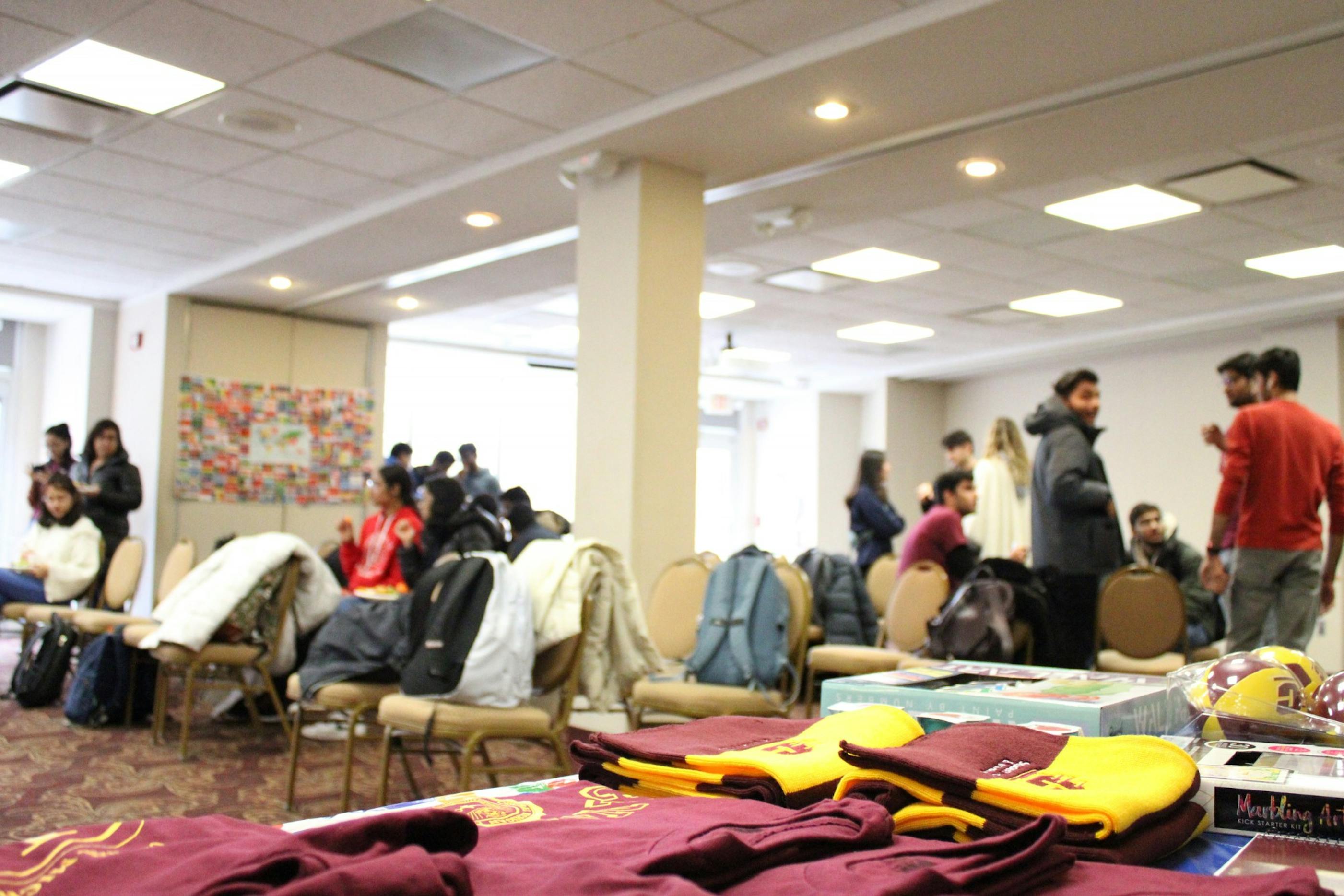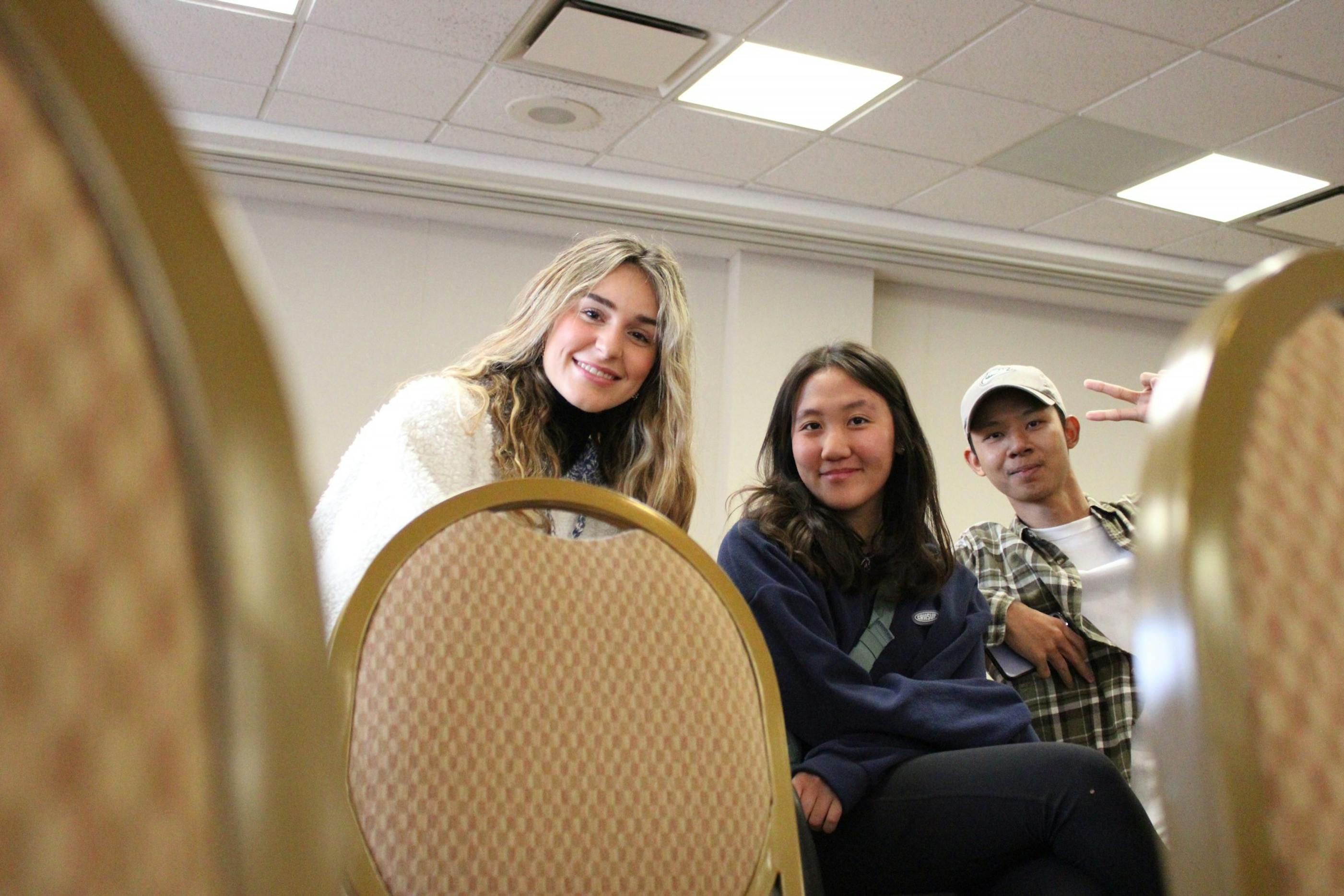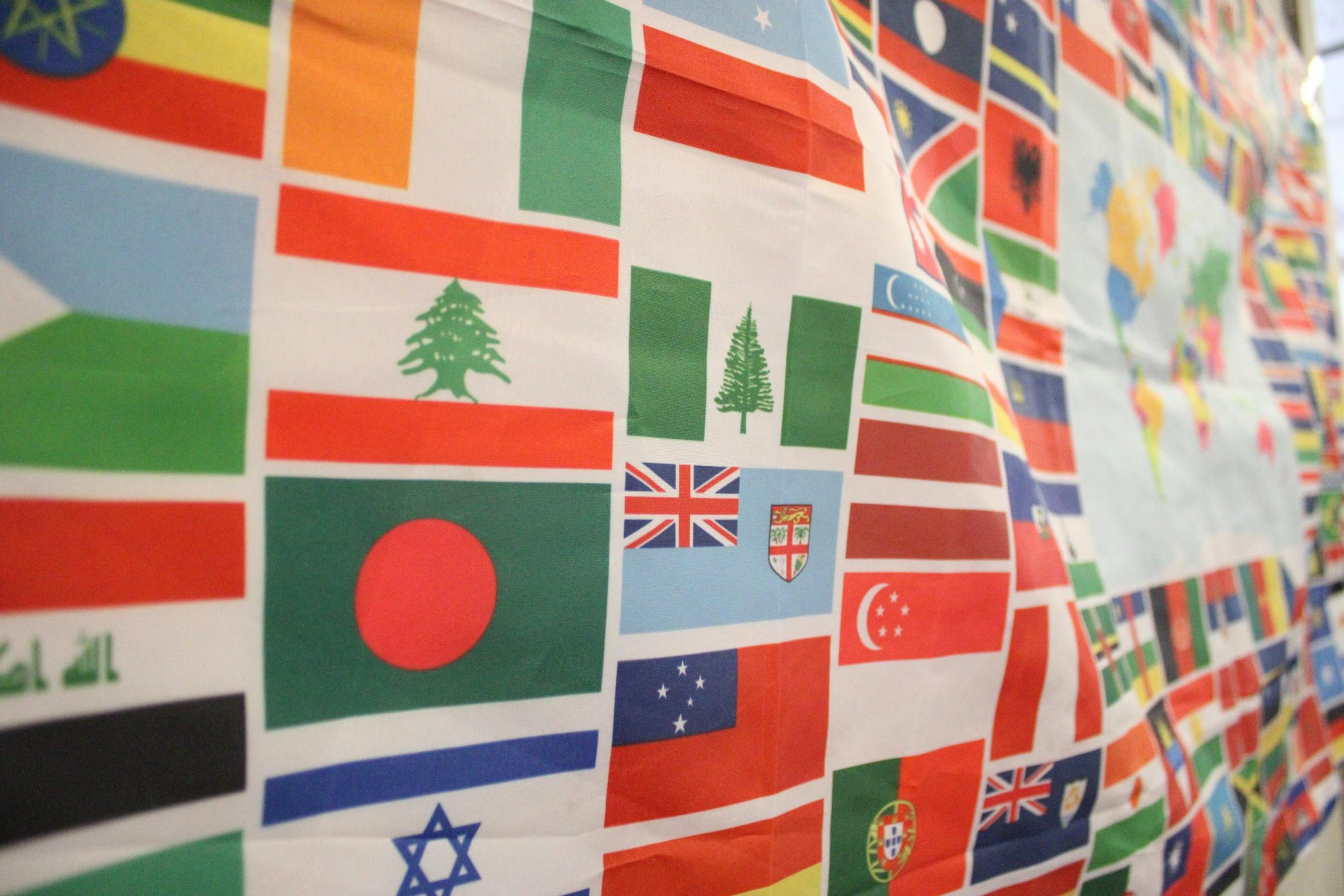What international students should know coming to CMU: Tuition, housing, jobs

Flags from all over the world decorate the space for a new international students welcoming event on Jan., 21 at the Bovee University Center.
From all around the world 1,121 international students packed their lives into a suitcase and came to Central Michigan University in Fall 2022.
Ling Zhang, director of the Office of Graduate and International Recruitment, said over 300 more arrived for the Spring 2023 semester, the majority of whom are graduate students.
As CMU welcomes new faces, students have to get comfortable with its tuition, housing, employment opportunities and life in Mount Pleasant. Here is how to navigate each of these topics, according to students and staff at CMU:

For the start of the new semester students arrive from all over the world. To make friends and connection they gather at the welcoming event on Jan., 21 at the Bovee Univerisity Center.
Tuition
According to CMU’s website, international undergraduate student tuition is $800 per credit hour for lower level classes and $850 per credit hour for upper level. International graduate students’ tuition rate is $925 per credit hour for a masters and $1,010 per credit hour for doctoral work.
Vice President of Student Recruitment and Retention Jennifer DeHaemers said international tuition is around $200 more per credit than domestic student's tuition, because domestic students pay state taxes. Nevertheless, when applying to CMU, international students are automatically considered for the International President's Award, which reduces international tuition to domestic rates.
Other international student-eligible scholarships listed on the website are the International Scholar Award and International Opportunity Award.
"One of the things that we've always tried to do here at Central, whether it's for domestic students or international students, is really try to keep that price manageable for the students, as well as considering the scholarships that we offer," DeHaemers said.
Joseph Marah is a CMU senior from Sierra Leone. Marah said one of the reasons he came to CMU was the financial package. He said scholarships helped him cover around 91% of his tuition.
“It’s still expensive, but it was more affordable with (scholarships),” Marah said. “I’m only paying a little amount from pocket.”
Nirajan Budhathoki and Arjun Poudel are graduate students from Nepal. They both work as graduate assistants. According to CMU’s guidelines, graduate assistants receive a tuition waiver, meaning that CMU waives cost of tuition, as a financial aid resource.
Anusha Uprety is a CMU senior from Nepal. She recieved a transfer scholarship. She also receives a domestic tuition rate because her father taught at CMU.
“It (tuition) was not as bad because of the scholarships,” Uprety said, “but it could be cheaper.”
Marah said the price for studying in the United States is very different from his home, but the quality of American education is better.
“It’s a huge difference. … It’s not comparable,” Marah said. “But the thing is the standard of education back home is so bad.”
Poudel also said tuition at CMU is much higher than in Nepal, but when he was coming to get his doctoral degree he prioritized quality of education over price.
“It's a little bit expensive for us when you convert currency from here to your home country,” Poudel said. “But when you compare the tuition fees rates around the country, it's a little cheaper than some other universities.”
DeHaemers said CMU tuition is one of the lowest in the state.
In comparison, Michigan State University charges international undergraduate students $1,392.50 per credit hour in tuition for lower level courses and $1,435.75 for the upper level, while graduate student tuition is $1,605.75.
Undergraduate tuition for international students at Western Michigan University is $721.35 per credit hour for lower level classes and $791.46 per credit hour for upper level, which is cheaper than at CMU. However, graduate tuition at WMU is higher than at CMU, standing at $1,096.17 per credit hour.
“They (CMU) do a brilliant job with tuition,” Marah said. “I would say CMU is the cheapest in Michigan and probably in the country in terms of the domestic rate, unless you have a bad grade.”
DeHaemers said CMU has not raised its tuition in several years. The CMU Board of Trustees will decide whether to change rates this winter DeHaemers said. DeHaemers said the decision considers funding from the state, comparisons to other institutions in the state and Michigan's tuition caps.
“Some years (such as 2020) we decide we're not going to raise tuition at all because the situation economically is such that we don't think that's a good idea, that students can't bear it,” DeHaemers said.

Claudia Salvador (left), senior, Ashley Goh (center), junior, Danil Mazrain (right), senior, are international students at Central Michigan Univeristy welcoming new international students on Jan., 21.
Housing
Nearly all CMU students are required to spend their first two years in an on-campus residence. Exceptions are made for those students living with parents within 60 miles of campus, students older than 21, married students who are living with a spouse and veterans.
According to CMU’s website, there are East, South and Towers dorms and on-campus apartments. International students typically stay in the East dorms, which stay open during holiday breaks.
Marah said he stays in the Northwest Apartments, which is an on-campus residence.
“I have a scholarship that helps with that,” Marah said. “Without the scholarship, I (would) not be there because it's expensive.”
According to CMU’s website, housing prices per semester vary from $2,781 to $3,615 depending on location and living unit type. Meal plan options are offered from $2,260 to $2,843 per semester.
Undergraduate transfer students are eligible for a housing grant of $2,000.
“The housing is expensive,” Marah said. “But if they (CMU) make it affordable, that will bring in more students to live on campus.”
Uprety said housing prices add to the costs she pays at CMU even more than tuition.
“Housing costs are crazy,” Uprety said. “Especially freshmen (and) international undergraduates have it the worst.”
On-campus housing closes for the summer. International students may decide to go back to their home country or stay in the United States and look for alternative housing DeHaemers said. When coming back for the second academic year, international students have to return to the dorms.
Students who arrive earlier than the move-in day pay a $25 fee each day they stay in the dorms, DeHaemers said. However, she said that the students are not required to arrive earlier than the move-in day, but they can choose to. According to the international student visa F1, international students can arrive in the United States 30 days prior to the beginning of their course work.
Graduate students are not required to stay in the dorms.
Budhathoki and Poudel are living in off-campus apartments. They said the challenge with off-campus residence is that international students don’t know how housing in the United States works and they don’t have anybody to help them.
“If you don’t have anybody here, it’s very difficult for you to get into the housing … because there is a communication difference, there is a cultural difference” Poudel said.
Budhathoki said the difficulty for him was the apartment's capacity. He was seeking off-campus housing with his wife, but they were required to stay in a two-bedroom apartment rather than a single bedroom apartment. This meant the cheaper option was not available to Budhathoki and his wife.
Renee Watson, vice president of Student Affairs, addressed international students’ concerns about living off-campus in a Q&A event on Dec., 16. Many international students spoke at the event, and CMU staff and community members discussed how to help international students deal with their challenges.

Central Michigan Unviersity welcomes new international students for spring semester on Jan., 21.
Employment
Federal regulations require international students to work only on campus. Furthermore, according to the U.S. Immigration and Custom Services website, international students are allowed to work up to 20 hours while college is in session.
DeHaemers said the exceptions for international students working off-campus are Curricular Practical Training (CPT), Optional Practical Training (OPT) or declaring economic hardship. CPT is an internship for students who are still studying, and OPT is an internship after a student graduates.
In order to qualify for CPT or OPT, students have to spend at least one year on campus. Economic hardship is declared with the United States Citizenship and Immigration Services (USCIS) if there has been an economic collapse in the home country, war in the home country, death in the family or other situations.
For international students seeking employment on CMU’s campus, jobs are posted on the Student Employment Services website.
DeHaemers said international students are eligible for all the job positions except those that are marked as work-study. It is because the work-study are federally funded programs, that means funded by federal budget and are open for only domestic students who qualify for Federal Student AId (FAFSA).
Marah said he works on campus as a student office assistant at the Office of Graduate and International Recruitment, but the process for getting a job on campus was hard. He applied for a dining hall position in Fall 2022, but said he never got a response. Marah said DeHaemers helped him find the office assistant position.
“It's incredibly difficult to get employment here on campus on my own,” Marah said.
CMU Provost Nancy Mathews said international students who are accepted to CMU are given estimated cost of attendance, and they show their ability to pay for it in their I20’s -- documents for international students’ visa. That’s why she did not expect international students to be requesting job positions.
“One of the things that surprised me was what I was perceiving there to be an expectation that they (international students) get a job, but they had to show that they had the resources to come here without making additional money,” Mathews said. “I think, (there is) a disconnect there about student expectations versus what we have tried to say: 'This is what it's going to cost to come here. You should be able to do it with the resources you have and not have to take another job.'”
Marah said his job helps him to have funds for personal expenses, for example buying gasoline for his vehicle. Poundel said campus employment helps to pay for rent and living expenses.
“I know federal government does not expect us to come and work,” Marah said. “They expect us to be studying here. But the reality is we do need the jobs.”
Uprety said it is hard to find student employment because there are not many jobs available.
“There was such a big influx this semester of international students, so all the jobs are taken up,” Uprety said. “They (international students) don’t have the option to work outside of campus, and they don’t have jobs on campus.”
DeHaemers said the influx of international students was just one of the things that may have contributed to the lack of jobs problem. She also said that in the fall 2022 semester North campus dorms were closed, along with a large dining facility where a lot of international students could have worked.
Central Michigan Life previously reported on an issue that CMU international students are still facing. Additionally to the cost of tuition, housing and lack of jobs, international students reported CMU’s mandated health insurance policy to be a financial burden.
The insurance policy took effect in August 2022 when $638.40 was automatically charged to international students’ billing accounts. In total, this policy adds $1,532.16 per year to international students’ spending.
DeHaemers said the university has an Ad Hoc Committee that is currently looking for job opportunities and working on solving the lack of jobs for international students.
She said the university identified additional funds for creating job positions for international students. More information should be available soon.






